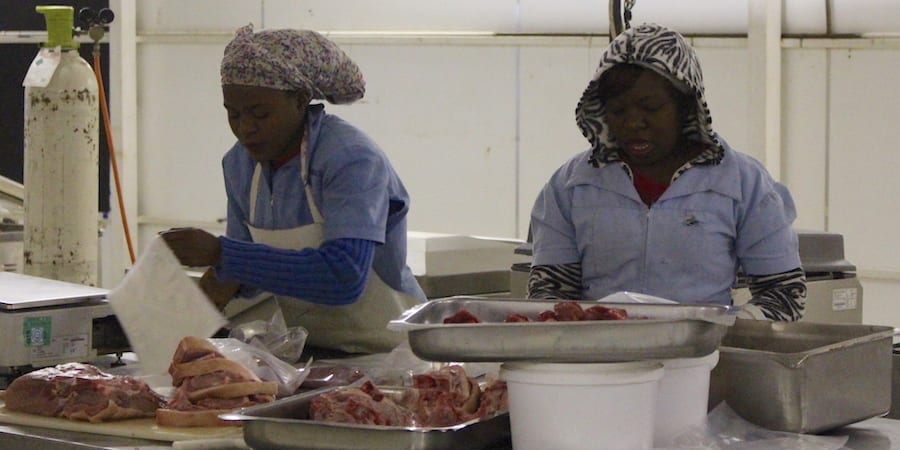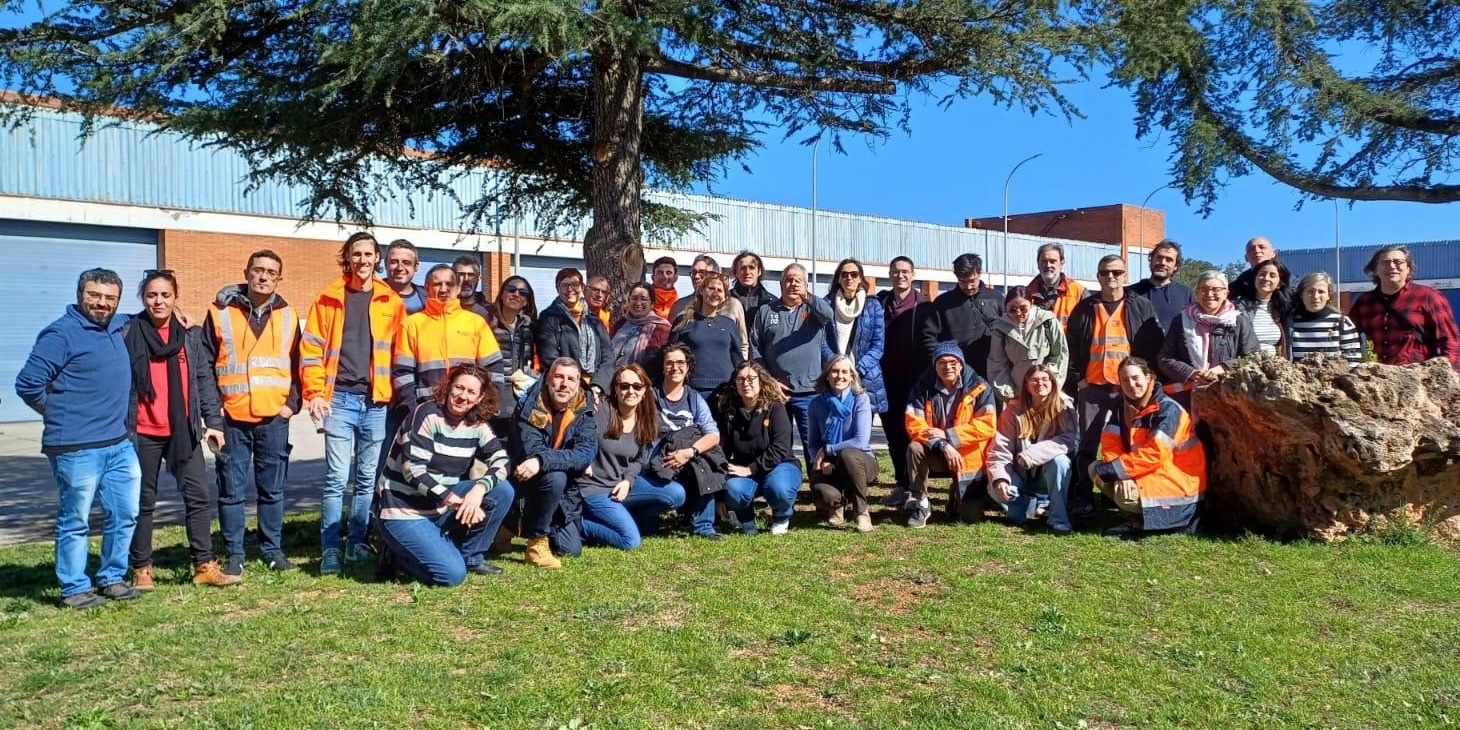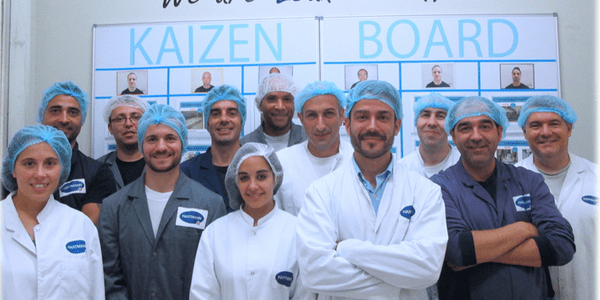
How lean management saved a butcher's shop in Botswana
CASE STUDY – Faced with complex logistics and customer complaints, a small deli and butchery in Botswana saw in lean a way to bring the business back from the brink. The philosophy didn’t fail them.
Words: Heinrich and Lydia Badenhorst, Owners, Delta Meat Deli – Maun, Botswana
Maun is a small community huddled in between the Okavango Delta and the Kalahari Desert. Tourism remains our main source of business: every year, approximately 50,000 visitors come to north-western Botswana to experience the untouched beauty of the Okavango Delta and admire its wildlife. They stay at the 30 or so camps and luxury lodges dotting the region.
Delta Meat Deli is a family business running a shop and an industrial butchery providing a wide variety of meat and dairy products and vegetables to the camps. People travelling to this part of the world pay good money to stay at the lodges, and therefore expect the highest-quality food. Standards are really high, and the menus chefs at the camp prepare need to reflect this.
The logistics we have to deal with as a business are complicated, to say the least. First of all, most camps send their food out by air, which means we need to abide to the different flying schedules and provide the airlines with the exact weight of the products we are supplying in advance. We then need to pre-freeze everything (as you can imagine, it gets really hot here, with temperatures as high as 38 degrees Celsius) and vacuum-pack it. Bear in mind that this all needs to be done in advance. We also manufacture our own meat products and have to ensure that the correct amounts of products are made to meet demand each week. On top of that, suppliers only supply once a week, as they are located about 600 kilometers from Maun – this means we have to ensure that the quantities we order are as accurate as possible or we will have either too much or too little.
Orders come in once a week (typically on a Monday), with flights normally going out to the camps on Thursdays and Fridays. A week might not sound like a short time, but a combination of poor internal processes and our weekly supply (we can’t ask suppliers to deliver to us in smaller batches, due to the distance they have to cover) meant we often had to rush to fill any shortages before we could seal the boxes, freeze them and then fly them out to the camps.
In early 2016, we went into a bit of a crisis when we faced unhappy customers and loss of business. It was devastating to watch our family business get to this point. Maun being a small town, we had heard that Sharon Visser from Ngami Toyota (a car dealership and repair workshop that Planet Lean featured recently) was applying something called “lean” that appeared to be making a huge difference for both the business and its staff. Desperate to save the deli, we approached Sharon to see if she could help us to harness the temperamental dragon our business had become. We knew that, as another businessperson here in Maun, she would understand the problems we were facing.
Sharon introduced us to lean and invited us on a guided tour of Ngami Toyota. We gained much insight during that gemba walk, and went back to work energized and full of fresh ideas. So began our lean journey.
In November 2016, we even joined Sharon and Halfway’s Terry O’Donoghue at the UK Lean Summit, hosted by Dave Brunt’s Lean Enterprise Academy. The event made us even more passionate about lean and helped us to see it as the never-ending journey it is.

IMPLEMENTING DIFFERENT VALUE STREAMS
The first thing we did was to observe the work. We started with a spaghetti chart, which revealed all the time people were wasting walking to and from freezer rooms – and to perform simple actions, like washing their hands. We then changed the workspace and split it into three clearly separated areas: meat manufacturing, packing of orders, and packing for the deli shop. We found this helped, as each workspace was more compatible with the jobs at hand.
Then we began to focus on quality and added visual aids to each workspace. These help the butchers to ensure that the quality of the meat is consistent: camps, which generally have around 30 beds, want every portion of meat to be around the same size. (This actually helps a lot with the meat manufacturing process.) We also implemented visual wall charts for daily meat manufacturing so that the butchers would not have to stop and wash hands every time they needed to turn a page to see the required work for the day, thus saving time. All the butchers had to do now was to look up at the chart. Packers were also given visual aids to ensure they could follow the new standardized work for packing boxes. This, too, went a long way to provide consistent quality to our customers. With the help of our eldest son Jaun, we made a big effort to try and maintain the new processes as stable as we could.
Our kaizens are simple, but they do the job! The new systems began to work so well that we managed to retrieve some of business that we had initially lost. We were so happy!
In January 2017, our son Fanie graduated and joined the team. He immediately took lean on with great enthusiasm as our way of doing business. He worked with the office administration to refine systems and created a Flow Chart. We placed it in the office, where everyone could see it. Mapping the flow immediately gave us a clearer idea of the situation, highlighting the most problematic points in the process.
We use different color codes to map how different activities throughout the process take place: the color blue maps production; red is for stored products; green is for vacuumed products; yellow for orders; and yellow and black stripes for documentation. Every time we act on a part of the process, we actively engage with the person involved. We also tell our people about any customer complaints we receive that they can have a direct impact on the work. It is important for us that lean not only improves our business but also creates positive outcomes for the community, both the people working for us and our customers. One of the comments we most frequently get from our employees is how much they appreciate the fact that, since lean was introduced, there is order in their work and they don’t have to fight and scream as they did before.
Before lean came into the picture, there was so much confusion. People would go to the freezers several times, get their products, then head back to their stations, then go back to collect more. They shouted all the time and asked each other to pick up products for them. No wonder it took us up to three days to pack for a camp!

KEEP ON CHANGING

Once we developed a better understanding of the work, we decided to change the layout of the butchery again to let products flow more smoothly through the process. We put the different steps in a straight line and all the machines closer together, to further reduce the distance people had to travel. We never stop our work to refine processes – to us, that’s what lean is about. What we often find is that we implement a system and it works for a while, but then as we grow or our situation changes, we have to create new systems. This is what makes lean exciting and challenging at the same time. This management philosophy simply won’t allow you to stay the same; instead, it forces you to always strive for a higher standard and better quality of work.
Another problem we experienced was with quantities: we would often finish products and have to run around Maun looking for whatever was missing. As a response, we began to order more than what we needed, which of course ate at our budget and affected the consistency of our pricing. We then started to calculate averages of what our customers use and just add a little bit extra to allow for fluctuation in demand. We keep a tiny bit of stock to ensure packers don’t run out of products and their work is not interrupted. We learned from Sharon and Terry that less is more and that batching is bad, so we try to avoid it wherever possible.
We then began looking at how we could refine the meat manufacturing processes, as it was getting harder for us to know what products should be made next. We changed from the visual board system to a simple crate system: today, when people pack the freezers and see that a crate is almost empty, they know they need to resume production of a certain product to replenish. This means we no longer run out of stock.
When it came to packing products for the deli shop in the past, the work wasn’t organized properly and people who were busy preparing meat for the shop would often have to stop what they were doing to go pack orders for the camps. Mornings were spent fulfilling orders, resulting in the deli shop not receiving its stock from the butchery until later in the day, sometimes as late as 12pm. And it’s not like people start working at a normal time, either: they arrive at the ungodly hour of 2am at the industrial butchery on a Monday (because the deli shop is completely empty after a weekend) and at 4am the rest of the week. The separation of processes we discussed earlier (on one side we have people preparing orders, on the other we pack products for the following week to ensure there is enough in stock) has helped us to ensure the deli is stocked with fresh product by the time we open it at 8am. These days, we first prepare products for the shop and then take care of orders for the camps.
Reflecting on our journey so far, I must say that one of the biggest advantages of introducing lean at Delta Meat Deli is the speed at which we can prepare orders. Originally, packers were tasked with packing for a number of selected camps. They often had to wait before they could start their piece of work. To save time, we introduced the key figure of the “shopping packer”: armed with a clipboard carrying all the necessary information, this person pulls products from the cold rooms (which are organized by kind of food – such as dairy, meats, fish, and vegetables – to make things easier), places them in a supermarket trolley, and distributes them to each individual packer. Each camp has a color code for delivery and efficiency purposes. To avoid mistakes, each box is also numbered and comes with a load sheet that lists its content. This also helps us to find lost boxes. (The new process makes our job easier for us, benefits our customers, and assists us in locating the source of a problem.)
All of this has made the packing process a lot faster. In the past it would take us two to three days to pack food for one of the Delta camps, whereas today we can do it in three hours!
Lean really does open up your mind to new opportunities, and it’s clear how much it’s already done for us. We are finally catching up with the work, our quality has increased dramatically, we got our customers back and we can now see a future (hopefully not too far) in which our people come to work and go home at regular times. It’s important for us that they have normal lives. Lean has changed our lives, our business and even how we deal with our customers. It saved our bacon… quite literally.
I would go as far as saying that lean is restoring a sense of pride in working and doing business here in Maun. Both at our deli and at Ngami Toyota, employees are excelling and the business has seen dramatic improvements since lean was introduced. Could our little community become Africa’s first “lean town”? We think it just might: Sharon and Dave are even hosting its very first Lean Summit in 2018! We at the Deli found great value in learning from the team at Ngami, and our experience shows that getting started with lean is possible anywhere. Imagine the impact on our town if more organization followed our example!

THE AUTHOR

Read more


CASE STUDY - The Catalan government’s infrastructure unit used lean experimentation, training, and A3 problem solving to improve service, safety, collaboration, and outcomes.


INTERVIEW – A specialist in control solutions for air-conditioning, refrigeration and heating, Carel Industries first applied lean to R&D a decade ago, when few companies did. We asked them how their journey unfolded.


FEATURE – This article explores the integration of lean leadership behaviors with digital tools to achieve sustainable performance improvement in modern organizations.


CASE STUDY - Through the involvement of front line staff, Hartmann’s production plant near Barcelona is paving the way for an expansion into different markets and inspiring the adoption of lean across the multinational.

